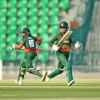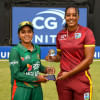Harsh realities of women’s cricket

The 2018 Asia Cup triumph was a watershed moment for women's cricket. It turned heads, showed that women cricketers in the country can bring glory to the nation despite taking a backseat to the men's game in terms of the magnitude of facilities, fan following, and so forth. Five years on, there is a certain stagnation with little progress.
Many promises were made but little has come to fruition. A part of ICC's current revenue sharing model categorises the performance of women's teams in ICC events as a metric alongside men's game, but the Tigresses have not made much impact besides being mere participants.
Bangladesh's performance in such ICC tournaments has fallen below the expectations set after breakout 2018. Despite the success that year, a proper setup is still unavailable to enable growth of the women's game. By and large, there are little means of training facilities available across the country. Thus, talents do not come through, impeding the competitive grind of domestic tournaments.
The Women's Dhaka Premier League (WDPL) is ongoing at the moment but how competitive is it when there is an inherent lack of quality players? Two teams dropped out of the tournament before the start of this season, citing they did not have enough time to build squads. Was it a lack of interest? It is the lack of long-term planning around the women's game showcased once more. With WDPL being the torch-bearer for developing the domestic circuit, two teams dropping off at the eleventh hour shows the prevalent culture of decision-making without forethought.
If this is prevalent in domestic cricket, it is indeed more serious at international level since without proper long-term planning and its execution, propensity for success diminishes. In the last T20 World Cup in 2023 in Australia, the Tigresses returned home without a win in the group phase - as they did in three preceding editions of the showpiece event.
Bangladesh are languishing at eighth in the ICC Women's Championship Standings 2022-25 -- used to determine qualification into the World Cup -- and their only points so far have come from abandoned matches. Winning qualifying tournaments to get to ICC events have come easily for the Tigresses but continuously failing to get past the group phase in main events reflects shortcomings in terms of results.
A look at the current status of the women's game around the world gives an idea of how far off Bangladesh still are but the bigger headache should be about coming out of the stagnation at present. One or two wins will certainly have merits but will not satisfy the need for long-term plans required for growth.
In the 2020 T20 World Cup, the highest attendance for a women's game was attained in Australia. While ICC continues to boast about the growth in women's cricket's audience, the game here is yet to pull in crowds. As a result, it is harder to attract sponsors as the women's game is still a supplementary commodity alongside the men's game in Bangladesh. Meanwhile, India have inaugurated their own franchise tournament, WPL, which has been making waves.
While there are societal constraints to the women's game here more pronounced than in most countries which impeded the growth of women's cricket here, the lack of long-term planning, unfulfilled requirements of financial security and facilities have stagnated progress and hurt the Tigresses.

 For all latest news, follow The Daily Star's Google News channel.
For all latest news, follow The Daily Star's Google News channel. 










Comments